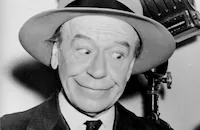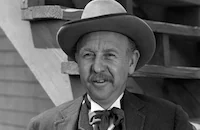And So They Were Married

Brief Synopsis
Cast & Crew
Elliott Nugent
Melvyn Douglas
Mary Astor
Edith Fellows
Jackie Moran
Donald Meek
Film Details
Technical Specs

Synopsis
Just before Christmas, widower Stephen Blake arrives at the gala opening of Snowcrest Lodge, followed by a group headed by divorcée Edith Farnham, her ten-year-old daughter Brenda and their maid, Ellen. The two groups are immediately at odds because of a near collision on the snowy road leading to the lodge. The lodge sports director Ralph P. Snirley and the hotel hostess, Alma Peabody, try to start a romance between Stephen and Edith, who are the only guests because heavy snows prohibit passage to and from the lodge. Stephen and Edith decide to ally themselves against the intrusive Snirley and Peabody. They flirt during a walk in the snow, then notice that the road has opened. Stephen's son Tommy arrives trying to keep the presence of his dog Harold secret. Harold demolishes Brenda's snow "lady" and she and Tommy fight. While Stephen and Edith dance at the lodge, the children overhear Miss Peabody predict wedding bells, and decide to work together to keep their parents apart. Stephen proposes marriage to Edith as they slide down the mountain snow, and she accepts. To avoid losing their Christmas presents, Tommy and Brenda attempt a truce that ends in a fight that blows the lodge's fuses. In the ensuing darkness, Stephen accidentally spanks Brenda, and he and Edith decide that their marriage would hurt the children. Both leave the lodge depressed and return to their homes in the city. During a phone call, Tommy and Brenda decide to reunite Stephen and Edith by disappearing. Their parents suspect they have been kidnapped and search for them but fail to notice the children asleep in the rumble seat of their own car. Police see the children, however, and arrest Stephen and Edith because the children deny that they are their parents. After spending New Year's Eve in jail, Stephen and Edith are finally identified by Snirley and Miss Peabody, who are now married. While Tommy and Brenda each try to protect the other from punishment for the scheme, Stephen and Edith realize that the children like each other at last and decide to marry.

Director

Elliott Nugent
Cast

Melvyn Douglas

Mary Astor
Edith Fellows
Jackie Moran

Donald Meek
Dorothy Stickney
Romaine Callender

Douglas Scott
Margaret Armstrong

George Mckay
Phyllis Godfrey
Olaf Hytten
Jay Eaton
Hooper Atchley
Gennaro Curci
Alan Bridge
Ernie Alexander
Jessie Perry
Margaret Morgan
Adolph Faylauer
Kernan Cripps
Anne Schaefer

Charles Arnt
Joe Caits
Gus Reed
Beatrice Curtis
Beatrice Blinn
Wade Boteler

Charles Irwin
Gene Morgan

Bud Flannigan
William Irving
Crew

Film Details
Technical Specs

Articles
And So They Were Married
Elliott Nugent's And So They Were Married (1936) begins with the mismatched lovers jockeying for control of a snow-covered road. Stephen Blake (Melvyn Douglas) is a widower and Edith Farnham (Mary Astor) is a divorcee, traveling with her daughter Brenda (Edith Fellows). Both cars are headed to the Snowcrest Lodge and, shortly after they arrive, a snowslide blocks the way for any other guests to follow.
For the mousy hotel manager (Donald Meek), this means disaster, "25 waiters, 4 chefs, a 10-piece jazz band and two guests!"
Isolated in the snowy paradise, Stephen and Edith feud at the front desk, on a slope, and in the dining room (hurling paper streamers and dinner rolls while the band plays to the near-empty hall). Eventually, the warring guests decide to call a truce and spend some time together, as a means of avoiding the lodge's overeager social directors, Mr. Snirley (Romaine Callender) and Miss Peabody (Dorothy Stickney). Thereupon the ice begins to thaw and romance appears to bloom.
Once the roads are cleared, Stephen is joined by his ten-year-old son Tommy (Jackie Moran), who promptly engages in fisticuffs with Brenda after she catches him spitting BB's at her snowlady. When the kids realize that their parents are attracted, they take extreme measures to drive the would-be stepparents apart. Screwball antics ensue, the most memorable being when Tommy's dog, foaming at the mouth, disrupts a swank dinner party.
By the time the scamps succeed in alienating their parents' mutual affection, they grow remorseful, having accidentally become friends. As the winter holiday draws to a close, Brenda and Tommy realize that they will have to resort to equally desperate measures to drive their parents back into each other's arms.
In spite of the ever-turning wheels of fate, there is little question about whether or not the mismatched guests will eventually find romance. As The New York Times quipped in its review, "And So They Were Married gives away nearly all the story it has to offer in one titular burst of generosity." But seldom is the outcome of a screwball romance difficult to predict. The pleasure comes from watching the serpentine journey to that happy fade-to-black union. The Times failed to appreciate And So They Were Married's simple formulaic pleasures, dismissing it as "an undistinguished but passably entertaining film."
Produced under the title Bless Their Hearts, the screenplay was based on a story by Sarah Addington. Best known for a series of playful children's books, such as The Pied Piper in Pudding Lane and Tommy Tingle Tangle, Addington was also considered a "Modern." She crusaded for women's suffrage, earned a degree at Columbia University's Pulitzer School of Journalism (where she was the only woman of her class), and worked her way up the ladder at a series of newspaper jobs. After marrying financier Howard Carl Reid, she retained her maiden name and continued to write. According to her obituary, "Although illness early crippled her ability to assume responsibility outside her library, she was always an ardent supporter if not an active participant in numerous liberal movements and literary groups." For health reasons, she spent many of her final months in Mexico, where she became "an authority on the movements there for political and social reorganization." Addington died in New York City on November 7, 1940.
Multi-talented director Elliott Nugent hailed from a vaudeville family, co-writing and co-starring in several plays with his father, J.C. Nugent. Moving West, he became a Hollywood actor (So This Is College [1929]), screenwriter (The Unholy Three [1930]) and director (The Mouthpiece [1932]). After And So They Were Married, Nugent specialized as a director of vehicles for legendary comedians, including Bob Hope (My Favorite Brunette [1947]), Bing Crosby (Just for You [1952]), Mickey Rooney (My Outlaw Brother [1951]), and Harold Lloyd (Professor Beware [1938]).
Director: Elliott Nugent
Producer: B.P. Schulberg
Screenplay: Doris Anderson, Joseph Anthony and A. Laurie Brazee
Based on a story by Sarah Addington
Cinematography: Henry Freulich
Music: Howard Jackson
Cast: Melvyn Douglas (Stephen Blake), Mary Astor (Edith Farnham), Edith Fellows (Brenda Farnham), Jackie Moran (Tommy Blake), Donald Meek (Hotel Manager), Dorothy Stickney (Miss Peabody), Romaine Callender (Ralph Snirley), Douglas Scott (Horace).
BW-74m.
by Bret Wood

And So They Were Married
Quotes
Trivia
Notes
The working title of the film was Bless Their Hearts. Although opening credits on the viewed print list Melvyn Douglas as the character "Hugh" Blake, he is clearly called "Stephen" throughout the film.














